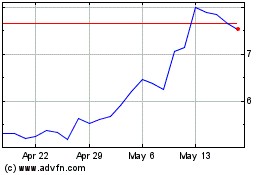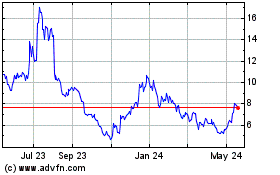The Typical Homebuyer Pays Roughly 2% Less than the List Price–The Biggest Discount in 2 Years
February 12 2025 - 7:00AM
Business Wire
Redfin reports many listings are selling for
under asking price, and most are lingering on the market. Florida
homebuyers are seeing the biggest discount.
(NASDAQ: RDFN) — Today’s average home listing is selling for
under its asking price, and taking a long time to sell, according
to a new report from Redfin (redfin.com), the technology-powered
real estate brokerage. While that’s not ideal for sellers, it’s
good news for homebuyers who have been grappling with high housing
costs and a shortage of inventory.
Redfin data as of January shows that nationwide, buyers may have
more room for negotiation than they have in several years:
- The typical U.S. home is selling for 1.8% less than its asking
price, the biggest discount in nearly two years.
- The typical home that sells is taking 56 days to go under
contract, the longest span in nearly five years.
- More than half (56%) of listings are sitting on the market for
at least 60 days without going under contract, roughly the same
share during this time of year in 2023 and 2024. That’s down from
the prior month, when 61% of listings were on the market for at
least 60 days–the highest share in five years.
Today’s housing market is slow mostly because it’s so expensive
to buy a home. The average 30-year mortgage rate was 6.96% in
January. That’s down from the two-decade high of 7.62% hit in 2023,
but remains well above the 3% to 5% rates that were common before
and during the pandemic. The median U.S. home-sale price is up 4%
year over year; together, high prices and rates have pushed the
typical homebuyer’s monthly payment near record highs. Political
and economic uncertainty is another reason some would-be buyers are
pumping the brakes.
The upside of a slow market is that buyers have an opportunity
to negotiate on price and terms for certain homes. Redfin agents in
some parts of the country report that it feels like a buyer’s
market, with sellers of homes that have been sitting on the market
for a few weeks open to lowering the price.
Other Redfin agents note that while the pool of unsold inventory
is growing and many homes are selling for under asking price, that
doesn’t necessarily mean buyers have a big pool of desirable homes
to choose from.
“More listings are hitting the market, but they’re not always
the type of home buyers want and need,” said Charles Wheeler, a
Redfin Premier agent in San Diego. “The listings lingering on the
market tend to be in unpopular neighborhoods, or require
renovation. Relatively affordable, move-in ready homes close to
highly rated schools are selling quickly, often with multiple
offers.”
In Coastal Florida, Homes Are Selling For Roughly 5% Below
Asking Price–the Biggest Discount in the Country
Homes are selling furthest below their asking price in Florida.
In West Palm Beach, Fort Lauderdale and Miami, the typical home is
selling for roughly 5% less than its asking price, the biggest
discount among the 50 most populous U.S. metros. Next come two
other Florida metros: Tampa and Jacksonville, where the typical
home is selling for about 4% less than its asking price. Homes in
all of those metros are also selling for a bigger discount than
they were a year ago.
Coastal Florida’s housing market has taken a hit as natural
disasters become more frequent and intense, causing some would-be
buyers to have second thoughts. Climate disasters have also led to
a surge in home insurance costs, HOA fees and property taxes in
Florida. Slow homebuying demand means more sellers are open to
accepting an offer under asking price.
The typical home is selling for over its asking price in just
seven of the 50 most populous U.S. metros, led by the Bay Area. The
typical home is selling for roughly 3% above asking price in San
Jose, CA, followed by Newark, NJ (2.5%), San Francisco (2.5%),
Oakland, CA (1%) and Nassau County, NY (0.5%).
More than 60% of Miami Homes Sit on the Market For 60+
Days
There are five U.S. metros where 60%-plus of listings are
sitting on the market for at least two months without going under
contract. Three of them are in Florida. In both Miami and
Pittsburgh, 63% of listings linger on the market for at least 60
days, followed by San Antonio (62%), Fort Lauderdale (61%) and West
Palm Beach (60%).
On the other end of the spectrum is the Bay Area. Just over
one-third of home listings in San Jose (34%), Oakland (36%) and San
Francisco (38%) are sitting on the market for 60 days or more,
followed by Boston (39%) and San Diego (42%).
To view the full report, including a chart, please visit:
https://www.redfin.com/news/homebuyers-paying-under-list-price-stale-inventory
About Redfin
Redfin (www.redfin.com) is a technology-powered real estate
company. We help people find a place to live with brokerage,
rentals, lending, and title insurance services. We run the
country's #1 real estate brokerage site. Our customers can save
thousands in fees while working with a top agent. Our home-buying
customers see homes first with on-demand tours, and our lending and
title services help them close quickly. Our rentals business
empowers millions nationwide to find apartments and houses for
rent. Since launching in 2006, we've saved customers more than $1.6
billion in commissions. We serve approximately 100 markets across
the U.S. and Canada and employ over 4,000 people.
Redfin’s subsidiaries and affiliated brands include: Bay Equity
Home Loans®, Rent.™, Apartment Guide®, Title Forward® and
WalkScore®.
For more information or to contact a local Redfin real estate
agent, visit www.redfin.com. To learn about housing market trends
and download data, visit the Redfin Data Center. To be added to
Redfin's press release distribution list, email press@redfin.com.
To view Redfin's press center, click here.
View source
version on businesswire.com: https://www.businesswire.com/news/home/20250212502513/en/
Contact Redfin Redfin Journalist Services: Ally Forsell,
206-588-6863 press@redfin.com
Redfin (NASDAQ:RDFN)
Historical Stock Chart
From Jan 2025 to Feb 2025

Redfin (NASDAQ:RDFN)
Historical Stock Chart
From Feb 2024 to Feb 2025
